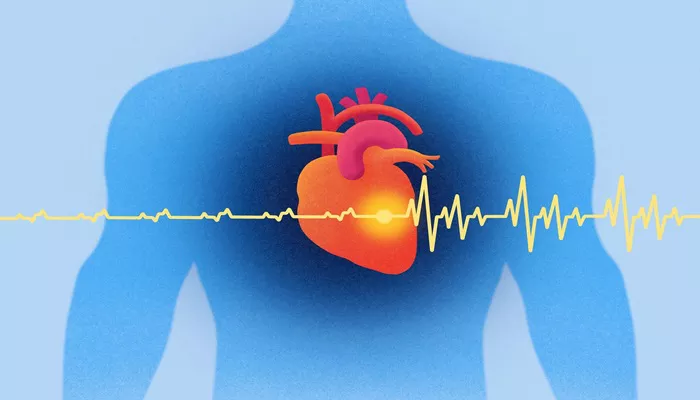Sinus arrhythmia is a common and generally benign condition characterized by slight variations in heart rate during a normal breathing cycle. While often harmless, certain situations or symptoms associated with sinus arrhythmia can be cause for concern. Understanding when to worry about sinus arrhythmia involves recognizing these warning signs and knowing when to seek medical advice.
What Is Sinus Arrhythmia?
Sinus arrhythmia refers to the natural fluctuation in heart rate that occurs with breathing. Specifically, the heart rate increases slightly during inhalation and decreases during exhalation. This phenomenon is most noticeable in children and young adults, often diminishing with age. In most cases, sinus arrhythmia is a normal physiological response and does not indicate any underlying heart disease or condition.
There are two primary types of sinus arrhythmia:
Respiratory Sinus Arrhythmia: This is the most common form, linked to the respiratory cycle. It is typically benign and more pronounced in younger individuals.
Non-respiratory Sinus Arrhythmia: Less common, this type may not be related to the breathing cycle and can be seen in older adults or those with heart conditions.
When Is Sinus Arrhythmia Considered Normal?
In the majority of cases, sinus arrhythmia is considered a normal variant of heart rhythm, especially in healthy individuals. It is often seen during routine checkups, particularly in younger patients. The condition typically does not cause symptoms or require treatment.
Some key points where sinus arrhythmia is considered normal include:
Age: Sinus arrhythmia is most common in children and young adults.
The heart’s response to breathing is more pronounced in these age groups.
Physical Activity: Athletes or individuals with high levels of physical fitness may exhibit sinus arrhythmia due to their well-conditioned cardiovascular systems.
Resting State: Sinus arrhythmia is often more noticeable when a person is at rest, particularly during deep breathing exercises or relaxation.
SEE ALSO: What Arrhythmias Are Treated with Atropine?
Signs That May Indicate A Problem
While sinus arrhythmia is usually benign, certain signs and symptoms may suggest an underlying issue that warrants further investigation.
These include:
Persistent or Severe Symptoms:
Dizziness or Lightheadedness: If sinus arrhythmia is accompanied by frequent dizziness, it may indicate that the heart is not pumping blood effectively.
Fainting (Syncope): Fainting spells, especially when recurrent, can be a sign of more serious arrhythmias or other cardiac conditions.
Chest Pain or Discomfort: Any form of chest pain, particularly if it occurs with sinus arrhythmia, should be evaluated by a healthcare professional.
Shortness of Breath: Difficulty breathing or shortness of breath, especially when not related to physical exertion, could be a sign of a more significant heart issue.
Irregular Heartbeat:
Palpitations: Sensations of a racing or irregular heartbeat that are noticeable and persistent may indicate an arrhythmia other than sinus arrhythmia.
Skipped Beats: Frequent skipped or extra heartbeats, especially if they cause discomfort, should be checked by a doctor.
Coexisting Medical Conditions:
History of Heart Disease: Individuals with a history of heart disease, hypertension, or other cardiovascular issues should be more vigilant about changes in heart rhythm.
Other Arrhythmias: Sinus arrhythmia occurring alongside other types of arrhythmias may require further investigation to rule out more serious conditions.
When to Seek Medical Attention
It is important to know when sinus arrhythmia requires medical attention. While the condition is typically harmless, certain scenarios should prompt a visit to a healthcare provider:
Sudden Onset of Symptoms: If symptoms such as dizziness, fainting, or chest pain develop suddenly or worsen over time, immediate medical attention is necessary.
Changes in Heart Rate: A sudden change in heart rate that is not related to physical activity or stress, especially if it is sustained, should be evaluated.
Worsening Symptoms: If symptoms associated with sinus arrhythmia are worsening or becoming more frequent, it may indicate an underlying issue that needs to be addressed.
Presence of Risk Factors: Individuals with risk factors such as diabetes, hypertension, or a family history of heart disease should be more cautious about changes in their heart rhythm.
Diagnostic Evaluation
If there is concern about sinus arrhythmia, a healthcare provider may recommend several diagnostic tests to evaluate the heart’s rhythm and function:
Electrocardiogram (ECG or EKG): This is the most common test used to diagnose arrhythmias. It records the electrical activity of the heart and can help identify sinus arrhythmia and other heart rhythm issues.
Holter Monitor: A Holter monitor is a portable device worn for 24-48 hours to continuously record heart rhythm. It is useful in detecting arrhythmias that may not be present during a standard ECG.
Echocardiogram: This ultrasound test provides images of the heart’s structure and function, helping to identify any underlying heart disease.
Stress Test: A stress test involves monitoring the heart while the patient exercises. It helps determine how the heart responds to physical activity and can reveal arrhythmias that occur during exertion.
Blood Tests: Blood tests may be used to check for underlying conditions such as electrolyte imbalances, thyroid disorders, or other factors that could contribute to arrhythmias.
Conclusion
Sinus arrhythmia is a common and often harmless variation in heart rhythm, particularly in younger individuals. However, certain signs and symptoms may indicate a need for further evaluation. Persistent or severe symptoms, changes in heart rate, or the presence of coexisting medical conditions should prompt a visit to a healthcare provider. Through proper diagnosis and, if necessary, treatment, sinus arrhythmia can be effectively managed, ensuring peace of mind and continued heart health.


